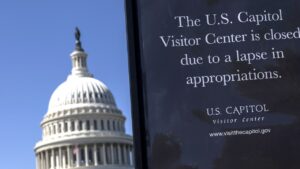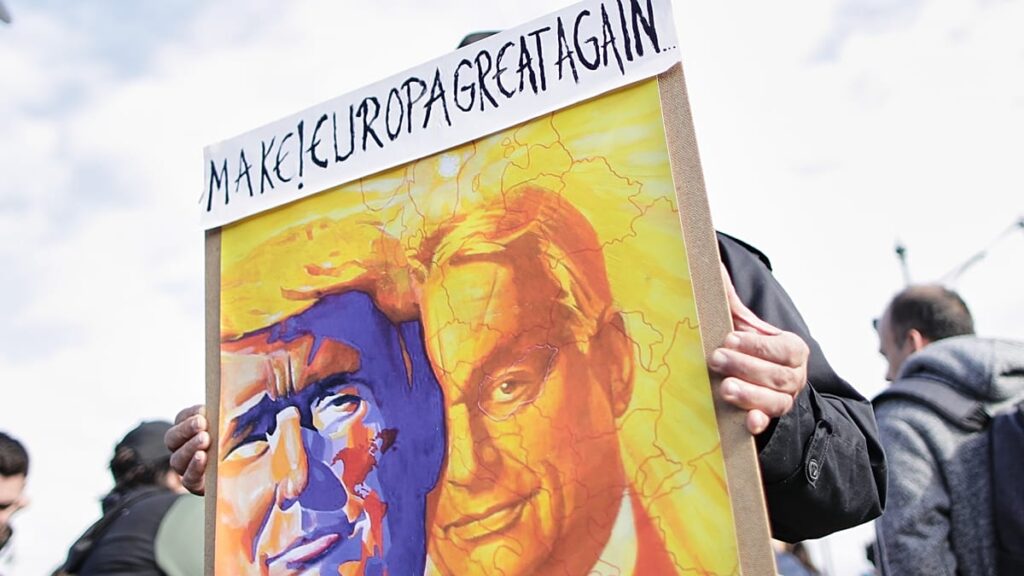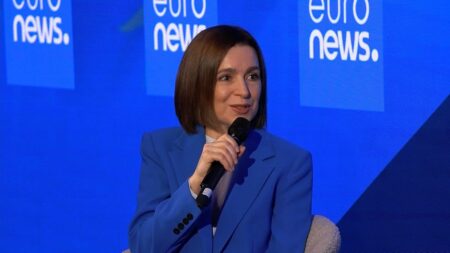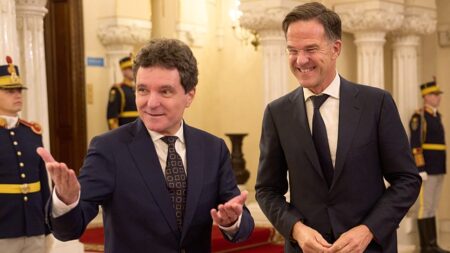Hungarian Prime Minister Viktor Orbán is leading a 180-strong delegation to visit President Donald Trump in Washington in a meeting that will put the spotlight on their friendship, but also bring ongoing tensions between the two to the forefront.
Orbán arrived in Washington on Thursday on a leased aircraft from the low-cost carrier Wizz Air as he heralded a special bond between the two countries in a “gilded age” for their bilateral relation. The Hungarian delegation is staying at the Blair House, the official state guest house of the United States, located directly next to the White House.
Before the trip, Foreign Minister Szijjártó said the US and Hungary worked hard in the last weeks preparing “a large economic and energy cooperation package that would greatly contribute to guaranteeing Hungary’s long-term energy security.”
One of the main topics during the visit will Russia’s ongoing war in Ukraine. Orbán was due to host a summit in Budapest between President Trump and Russian leader Vladimir Putin, before it was ultimately called off by the Americans on the assumption Russia was not ready for serious peace talks. Instead, the US issued the most severe energy sanctions against Russian energy companies since the war against Ukraine started.
Tensions over Russian oil imports
US officials have been calling on Hungary to cut Russian oil imports, which Budapest has consistently refused to do citing national security reasons. Orbán suggested after the sanctions were imposed on Lukoil and Rosneft last month that he would ask the US President for an opt-out. Trump has not indicated he is prepared to give him one.
“He has asked for an exemption, but we haven’t granted one. He is a friend of mine,” Trump told reporters over the weekend on Air Force One.
Earlier this month, US NATO Ambassador, Matthew Whitaker told Fox News that Hungary needs to present a plan to reduce Russian oil imports and the US is ready to assist Budapest.
Daniel Hegedűs, Regional Director at the German Marshall Fund of the US, told Euronews that Orbán’s main goal is now to get an exemption from the secondary tariffs imposed on Russian energy.
But it is not certain that he will get it, and it poses a risk for Orbán domestically.
“This meeting was requested by the Hungarians, but it is a high-risk meeting nonetheless because in the Hungarian domestic narrative, this mission has become tied to these exemptions,” Hegedűs told Euronews. Still, the Trump administration will not allow Prime Minister Orbán to leave these negotiations looking weaker, he argued, even if Hungary’s energy policy contradicts the wishes of the US government.
“Trump was crystal clear about that he wishes the re-election of the Hungarian prime minister. And against that background, they are aware that they should not weaken him. I think there will be at least a small symbolic victory provided for Orban,” Hegedűs said.
Hungary might offer deals to diffuse tensions over Russian oil
To diffuse the tensions, Hungary may offer trade and defence deals. One option could be to step up purchases of liquified natural gas from the US, in line with the EU.
“I can imagine that they will announce additional purchase of LNG to guarantee the energy security of Hungary” Hegedűs said.
Budapest and Washington have also been negotiating for years the purchase of small nuclear reactors. The US participation in the development of the Paks nuclear site could be on the agenda too, and the meeting could serve to facilitate a breakthrough.
According to the Hungarian edition of Radio Free Europe, a defense deal is also on the cards. While details are not known, the aim is “to have a cooperation to increase the capacities of the Hungarian army, possibly through joint ventures.”
Experts call on Trump to help Ukraine’s EU path
Trump and Orbán will also talk about the war in Ukraine.
Hungary has repeatedly said it stands ready to host a summit in Budapest, although the US has not given any indication that it is ready to resume idea.
Associate director at the Atlantic Council’s Europe Center James Batchik argues that the cancellation of the Budapest summit, coupled with the potentially disastrous effects from the new US energy sanctions on Russia, has put Orbán in a tenuous position.
The US could use its leverage over Budapest to press Orbán to remove his veto on Ukraine’s bid to join the European Union. In exchange for any sanctions relief or deals, Batchik believes that the White House visit “would be the perfect opportunity to end Budapest’s obstruction to Ukraine’s EU accession,” he said before the summit.
Hungary is blocking the opening of the negotiating chapters of Ukraine with the European Union on the basis that Kyiv is still at war and represents a security danger for the EU. The majority of European leaders are in favor of opening the negotiations and the European Commission suggested this week Ukraine is technically ready to do so.
US shuts down Hungarian service of Radio Free Europe
On Thursday, as the Hungarian delegation travelled to Washington, Kari Lake, a staunch Trump supporter and acting CEO at the United States Agency for Global Media, announced it would stop funding Szabad Europa, the Hungarian-language service at Radio Free Europe/Radio Liberty. The reduction in funding could precipitate the ending of Szabad Europa, one of the few critical outlets still operating in Hungary.
“This programming has undermined President Trump’s foreign policy by opposing the duly elected Prime Minister of Hungary Viktor Orban,” Lake wrote in a letter sent to the Congress members.
A member of Viktor Orbán’s Fidesz Party, András László, said Szabad Europa deserved to be shut down as it worked “against the American-Hungarian friendship” in a post on social media.
Read the full article here

















